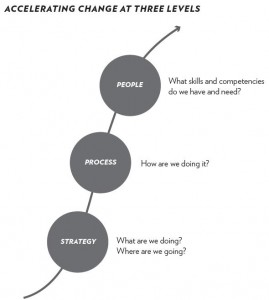We all want to be liked and accepted in both our personal and professional lives. But when it comes to effective leadership, a high need to be liked most often leads to disaster.
I’ve encountered many leaders who were genuinely “nice” people, and would do absolutely anything to support their people and make them happy. Sounds like a wonderful person to work for, right? In reality, these leaders had significant problems on their teams, and very low morale.
Leaders who place a high value on making everyone happy often sacrifice good decisions to do so. There is a difference between doing what is nice, and doing what is right. When leaders fail to do what’s right, they are not acting in the best interest of the organization and its employees. They lose the respect of their staff, create people problems, and cause morale to plummet.
Here are 4 major mistakes to avoid as you walk the fine line between being well-liked and highly respected.
Failing to deal with problem employees. Leaders who have a high need to be liked tend to ignore employee problems. They prefer to manage by “hoping-and-hinting.” First, they hope problem employees will improve and correct their behaviors without any intervention. When this doesn’t happen, they drop a hint. Instead of coaching, counseling, and terminating employees who do not want to improve, overly nice leaders ignore the problems or transfer the problem employee to another department. Doing so further undermines morale, and the leader loses the respect of their employees. Employees know that their manager is shirking responsibility by not dealing with the problems impacting the team. In fact, even the problem employee loses respect for their leader because they know the leader doesn’t have the guts or courage to deal with the situation in an effective manner.
Failing to act on problems quickly. As part of the hope-and-hint strategy, nice managers prefer to wait, hoping that the situation will improve on its own. If problems are not acted on promptly, problems within a department or organization get worse, not better. The problems linger and worsen, and morale suffers. The employees blame management, and management blames employees. When there is a problem, swift action is required. The sooner you eliminate problems, the more respect you will earn as the leader.
Failing to set and maintain high performance standards. Nice leaders are often hesitant to set and maintain high standards of performance. They lower their standards when employees complain about their high expectations. After all, nice managers who have a high desire to be liked listen to their employees and make adjust accordingly. Ironically, it’s impossible to maintain high morale in a department or organization without having consistent standards and expectations.
Equal distribution of rewards for unequal performance. We currently work with several organizations who have phenomenal reward and bonus systems. These organizations consistently provide their employees with above average raises, and they award bonuses to every employee on a regular basis. How can an organization that provides bonuses once a year, or even once a month, ever have low morale? Morale suffers when there is no differentiation in the reward a top-performing team or employee receives versus the reward a low-performing team or employee receives. When rewards are not based upon performance, top performers’ morale and engagement suffers because the reward system is unfair. Why should they consistently go above and beyond, when those who do the bare minimum receive the same reward? In addition, low performers’ morale also suffers because they can’t see how their individual or team contributions are impacting the results.
Strong leaders understand that being respected is far more important than being well-liked by every employee. They take the following actions to ensure they are always acting in the best interests on their employees and organization.
Tell the Truth
Nice leaders tend to communicate in whichever way they think will avoid ruffling people’s feathers. They speak in overly general terms and hedge their words. In reality, people don’t trust or respect leaders who do not communicate honestly and openly. Be honest, and tell it like it is. If a member of your team presents an idea that isn’t in line with the vision and goals of your department, tell them the truth. Don’t mislead them by saying, “That’s a great idea, maybe we can explore it more in the future.”
Go with your Gut
When you think about doing the right thing, your gut will almost always lead you to the right decision. Your head will argue with your gut and encourage you to take the easy way out. If you know in your gut that you should address two team members who are not working well as a team, your head will try to convince you that maybe it will get better next week if you don’t say anything to either of them. Almost always, in these head/heart/gut arguments, the gut is right.
Hold People Accountable
When a vendor, direct report or cross-functional team member is not doing the job you need them to do, it’s important that you shoot straight and communicate the exact expectations that are desired. It is also important to ensure that they see the problem, are committed to fixing it, and are taking the actions necessary to correct the outcome.
Lean into Conflict
Very seldom does conflict in an organization or on a team go away on its own. It may go dormant because one of the counterparts decides they no longer want to bring up or discuss the topic, but it seldom goes away. As a leader, you will gain tremendous respect when everyone knows you are really comfortable leaning into, rather than avoiding conflict, and playing an active role in getting the issue resolved.
Make the Right Decision
Most times, there is a decision that is the right thing to do. Dealing with conflict is the right thing to do. Holding people accountable is the right thing to do. Ensuring that team members treat each other with dignity and respect is the right thing to do. Clarifying strategic direction and being able to articulate how we will go about accomplishing our goals is the right thing to do. Shooting straight and telling the truth is the right thing to do. On all of these examples, the converse will possibly lead to people describing you as “nice” but will not lead to respect for you as a leader.
Happy employees are not the result of leaders who spend their time pleasing every employee. Strong workplace cultures and happy, engaged employees are the result of great leaders who are willing and able to make tough decisions that are in the best interest of the organization. Make sure your actions are not misguided by a desire to be well-liked by everyone.
(178)








